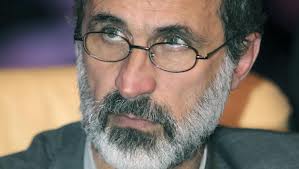 Syria’s outgoing opposition chief published an initiative for his war-torn country on Thursday that would grant President Bashar al-Assad a safe exit, and urged dissident factions to adopt his plan.
Syria’s outgoing opposition chief published an initiative for his war-torn country on Thursday that would grant President Bashar al-Assad a safe exit, and urged dissident factions to adopt his plan.
Ahmed Moaz al-Khatib published his initiative on Facebook, as the main National Coalition he headed until March gathered in Istanbul to choose a new leader and discuss a US-Russian peace initiative dubbed Geneva 2.
Under Khatib’s initiative, Assad would have 20 days from Thursday to give “his acceptance of a peaceful transition of authority.”
After accepting, Assad would have one month to hand over power to either Prime Minister Wael al-Halqi or Vice President Faruq al-Sharaa, who would then govern Syria for a transitional period of 100 days.
As part of the transition Khatib envisages, Assad would “leave the country along with five hundred people whom he will select, along with their families and children, to any other country that may choose to host them.”
This is the first time one of Syria’s opposition chiefs has made an offer of political immunity to Assad and key members of his regime.
Khatib’s proposal is an effort to pull Syria “out from the catastrophe that has struck our nation”, said the former Omayyad mosque imam and controversial opposition figure on Facebook.
It is also “a practical response to the need of a political settlement ensuring a peaceful transition of authority”, Khatib added.
“This initiative is a product of Syria and its goal is Syria,” he said.
While calling on dissident groups to adopt the initiative “as a way out from the catastrophe that has struck our nation”, Khatib also said the international community should “oversee it and ensure that it is implemented.”
This would be accompanied by the release of all political prisoners in Syria, Khatib wrote.
The initiative gives Assad a month to “completely hand over authority”, and stipulates that while parliament should be dissolved, all of its powers should be handed to Assad’s replacement.
Over the same 100-day period, an interim government would “restructure the security and military” apparatus in Syria, said Khatib.
He also suggested that the UN should appoint an international mediator to oversee the transition.
At the end of the 100 days, the responsibilities of the current government would pass to the transitional government, formed with international guarantees, which would “be responsible for the preparation and the re-building of the new Syria,” Khatib said.
Khaled Saleh, spokesman for the opposition coalition, said it was a “personal initiative” that would be “submitted at the coalition meeting and maybe discussed.”
NOW/ AFP

Leave a Reply
You must be logged in to post a comment.